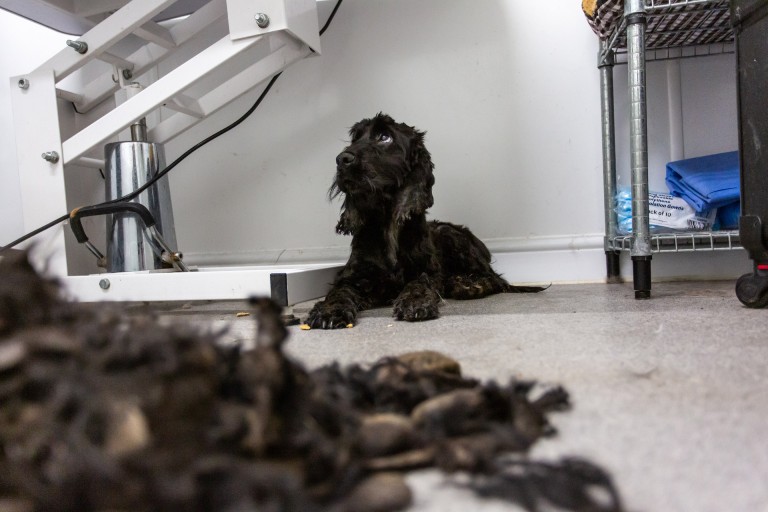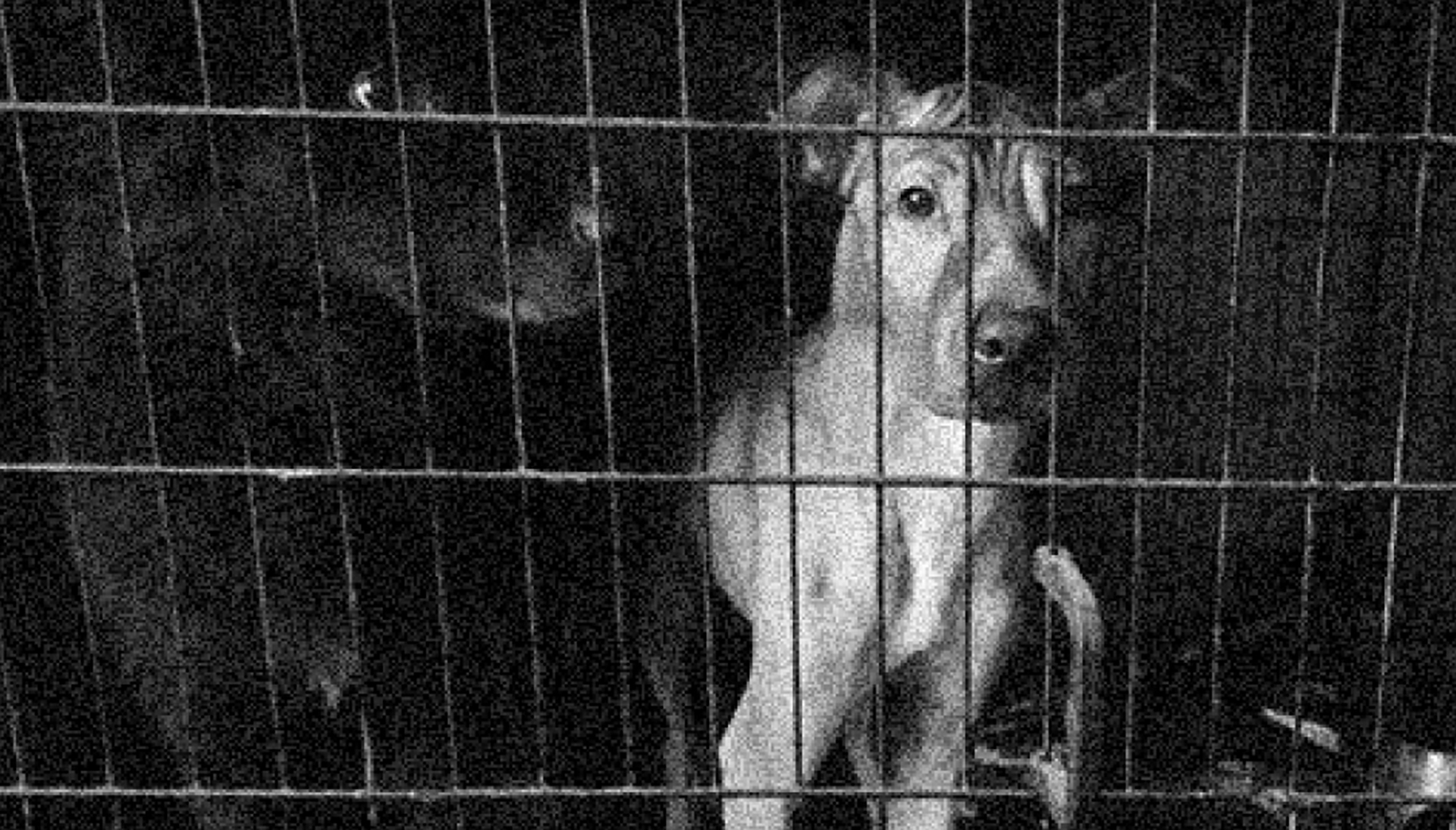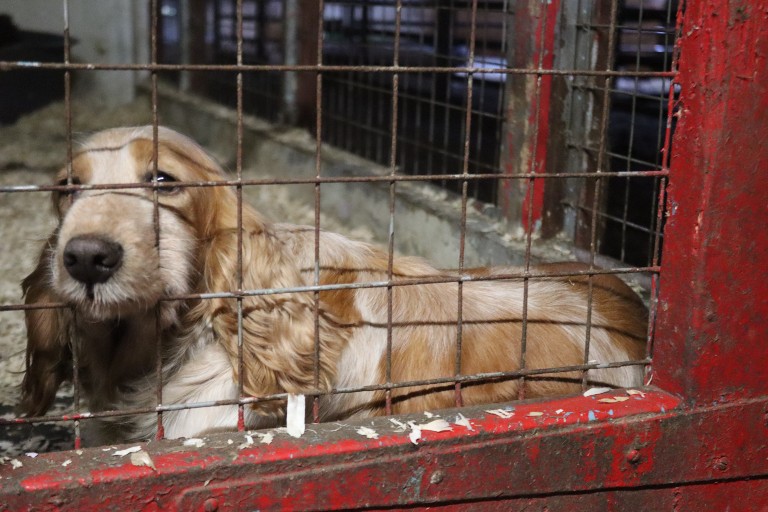
Canine Fertility Clinics
Find out about unlicensed canine fertility clinics – the unethical breeding businesses with ties to organised crime and the illegal puppy trade.
Our Special Investigations Unit (SIU) investigates serious, organised and protracted animal-related crimes. Dedicated to ending animal exploitation and cruelty in Scotland, they work tirelessly to bring perpetrators of serious animal crimes to justice. Unlicensed canine fertility clinics have started popping up across Scotland and it’s our duty to stop their fraudulent and exploitative behaviour.
What is a canine fertility clinic?
Canine fertility clinics are practices that help people with breeding their dogs. They usually offer advice, tests and procedures to aid fertility and pregnancy. Whilst these clinics can operate innocently, the number of unlicensed clinics in Scotland has exponentially risen since the Covid-19 pandemic. Without a license, these places operate with no safety regulations and are often staffed with unqualified and untrained individuals.
These unlicensed clinics practice under the guise of legitimacy, acting as trained professionals to ‘support’ the reproduction of dogs. They charge extremely high rates, and purposefully breed ‘high value’, ‘popular’ dogs, or those that struggle to give birth naturally, such as Pitbulls and French Bulldogs.
These places have infiltrated Scotland’s high streets recently, taking advantage of the high demand for puppies, exacerbated by the Covid-19 pandemic. Much like puppy farms, canine fertility clinics go to lengths to conceal their criminality, preying on unsuspecting dog owners and feeding the underworld of the illegal puppy trade. Many puppy farmers and dealers will use these clinics to further their own exploitative operations.
What services do they offer?
Canine fertility clinics require a license and qualified veterinary surgeons in order to perform invasive, surgical procedures such as artificial insemination and intravenous blood sampling; however, this often doesn’t deter criminals from opening clinics without medical professionals or licensing in place. Without the correct training, individuals performing these procedures can impart unnecessary pain and suffering onto the dogs in their ‘care’.
To effectively artificially inseminate a dog, you must first test their fertility and hormone levels which can be done by progesterone testing. This runs the dog’s blood and determines the optimal time for artificial insemination. This test requires an intravenous sample be taken which is extremely invasive and when performed by someone unqualified, can result in the harm of the animal.
These clinics also provide services such as:
- Ultrasound scanning
- Semen extraction
- Administering of medications
Fertility procedures can be helpful for ethical breeding when performed by a vet. Unfortunately, unlicensed clinics are becoming increasingly convincing in their facade of legitimacy.

The problem with unlicensed canine fertility clinics
These unlicensed clinics are unregulated by any health and safety standards, putting each canine ‘patient’ at risk of harm, disease and long-term health issues.
With links to the illicit puppy trade, these clinics operate with no veterinary involvement which means they prescribe and use medicines illegally, as well as illegally performing procedures. Surgical procedures are dangerous, especially at the hands of someone untrained and unqualified.
These unlicenced clinics encourage the breeding of high demand, popular dogs, especially those with specific physical characteristics, like ‘flat faces’. This is done to the detriment of the puppy’s health and well-being. The clinics promote aesthetics over welfare, assisting low welfare puppy breeders with overbreeding, and unethically breeding dogs that have inherent aggression or health issues. By breeding dogs to have extreme or exaggerated physical characteristics, these clinics are furthering the trend of aesthetics over health and leaving puppies with lifelong health issues.
How to spot an unlicensed canine fertility clinic
As with puppy farms, these clinics are becoming increasingly difficult to differentiate from their licensed counterparts.
If you’re suspicious of a clinic, do your due diligence and ask questions. Ask about staff qualifications and training, their license, or about any relevant health checks they can perform on your dog to see if it’s fit to be bred. If they struggle to answer any of these, do not let them administer treatment or perform procedures on your dog.
Always do your research before visiting a clinic, check their reviews and look into the services that they offer. Do they have a host of popular, ‘designer’ breeding dogs such as Pugs, French or English Bulldogs or pocket bullies? Do they have abnormally high prices? Are they performing a number of invasive procedures that seem suspicious?
If you’re suspicious at all, do not give your business to them. This exploitative industry only exists if you fund it.
Regulation
The regulation of these clinics is not up to standard and we’re currently campaigning to have proper legislation in place that promotes ethical breeding and helps us shut down exploitative practices.
As unlicensed fertility clinics are operating without veterinary oversight, it means that the Royal College of Veterinary Surgeons can’t regulate or investigate them. Canine fertility clinics operate within a grey area of regulation and this needs to change in order to protect Scotland’s animals against abuse and exploitation. The Veterinary Surgeons Act 1966 must be reformed to include canine fertility clinics.
How you can help
Unlicensed canine fertility clinics are fraudulent, exploitative practices that perform intrusive, harmful treatments in the name of profit.
Always do your research and ask your vet for advice if you want to look into ethical breeding or fertility procedures.
If you’ve had a distressing or negative experience at a canine fertility clinic, or are aware of any suspicious clinics in Scotland, then please get in touch today.
Support our Special Investigations Unit
As part of a charity, our efforts to combat and convict crimes against animals are entirely funded by donations. Each time you donate to the Scottish SPCA you’re not just contributing to the care and protection of Scotland’s animals, you’re assisting in the fight against serious animal-related crimes.
Please consider donating today and help us put a stop to as many of these abusive operations as possible.

Together, we care for them
With your support, we can continue to care for Scotland’s animals every minute of every day. Your donation funds campaigns, research and projects to help give animals the life they deserve. Every £1 matters to all animals in our care.

